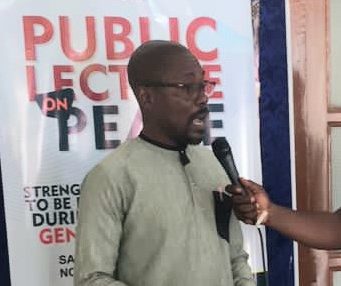Mr. Mawuli Agbenu, the Greater Accra Regional Director of the National Commission for Civic Education (NCCE), has reiterated the call on Ghanaians to refrain from electoral violence.
He underscored the need for the Ghanaian electorate and said electoral violence posed a significant threat to democracy, stability, and social cohesion, warning.
Mr. Agbenu noted that acts of violence, intimidation, and vandalism could undermine the legitimacy of election results and damage public trust in the political system.
He said this during a 2024 lecture on peace, organised by the Presbyterian Church of Ghana, Ga Presbytery, Department of Ecumenical and Social Relations, under the theme “Strengthening Our Capacity to be Peacemakers Before, During, and After 2024 General Elections.”
He was accompanied by Mr. Edem Afeeva, the Ayawaso West Municipal Director of the National Commission for Civic Education (NCCE), and some staff of the commission.
Mr. Agbenu explained that electoral violence leads to injury and death of civilians, destruction of properties, hardship for citizens, accentuates underlying chieftaincy and ethnic conflicts, as well as affects political participation, as it erodes trust in the process leading to low turnout at the polls.
The NCCE regional director further explained that it caused political instability and human rights violations, stalls infrastructural and economic development, tarnishes the international image of the country, brings about economic stagnation, and also creates a state of anxiety and breakdown of law and order.
He mentioned that although Ghana was known for its vibrant democracy and rich history of holding regular elections to choose its leaders, there were identiable threats such as misinformation, disinformation, fake news, rumour and hate speech, religious bigotry and interference, electoral violence, corruption, and money in politics, among others, that could discredit Ghana’s election record.
Mr. Agbenu explained that some drivers of electoral violence included ethnic or religious divisions, disputed results due to electoral fraud, militant or vigilante groups, weak security measures, the perception that the Electoral Commission lacks integrity, and the winner takes all syndrome, among others.
He appealed to Ghanaians to safeguard peace and ensure that the democratic process proceeds without disruptions.
“Election is a formal process whereby eligible citizens choose their representatives or leaders by voting. It is fundamental to democratic governance and is used to make decisions about government leadership, public policies, and other important matters,” he stated.
While touching on credible elections, he drew the attention of the participants to benchmarks for credible elections, which include inclusivity, free, fair, and transparent elections, competitiveness, accountability, and others.
He said peaceful elections were a shared responsibility involving several agents and citizens, stating emphatically that the 1992 Constitution of Ghana had made provisions towards facilitating credible, peaceful, free, and fair elections.
Source: GNA

_
Follow us on our social media pages for more stories and posts from the NCCE.
https://www.instagram.com/nccegh/
https://www.facebook.com/nccegh/


Leave a comment